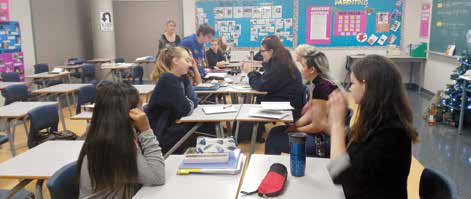How many of us have had a school assignment turn into an award-winning project?
During Grade 12, a young Caroline Pignat travelled to Ireland to visit family where her uncle gave her a crash course on their family history. Back in Ottawa, when she returned to her writer’s craft class at Notre Dame High School, she started writing what she had discovered. Years later, her writing turned into a novel, Greener Grass, which won a Governor General’s award for children’s literature in 2009. She would go on to win a second for her novel The Gospel Truth, in the fall of 2015.
Pignat now teaches writer’s craft at All Saints High School in Kanata. I recently had the privilege of sitting in on one of her classes. As she set up for the day, and as her students begin to filter in, I overhear them talking admiringly about their teacher, the award she just received, and how she looked in the photos taken at the award ceremony.
Sitting in on the class, which looks so different than my own writer’s craft class 10 years ago, I notice a few differences: coffee cups on the students’ desks, a couple of laptops, and cellphones in plain view.
Another noticeable difference is that when Pignat speaks to her students, she is not talking at them, rather she is having a conversation with them.
Of the students I spoke with, it became clear that their interests weren’t all about writing. One student loves NASCAR and wants to become a mechanic; another enjoys taking dance. But they all share a common liking of “Miss.” As Kelsey Mair explains: “She really cares about us, she’s not just here to teach.”
Janelle Rowsell, who wants to be a fashion writer, expounds about the support she receives from Pignat: “I like how she lets us write freely, she doesn’t shut [our ideas] down.”
One young girl, Marisha Boyd, a Grade 11 student who is taking the class a year early, says she’s been waiting to take Pignat’s class since middle school when she first started reading her books.
In spite of the awards and her abilities as a teacher, Pignat hasn’t always been so successful with her writing career.
“When I had my kids, that’s when I started writing. My mom told me I needed to do something of my own,” she says.
Pignat was writing children’s picture books at the time, but they weren’t selling. A friend told her to “write about what you know.”
“All I know is that my jeans don’t fit,” she replied.
So Pignat wrote a column about her jeans not being able to fit and pitched it to the Ottawa Citizen. They loved it and asked for more.
Then she won a trip to New York for a writer’s workshop. “That was the pivotal moment — when someone other than my mom said I could write.”
Now, Pignat has six books, two of which won her Governor General awards, and one, Egghead, which is studied in schools.
So when does this teacher and mother of two find time to write?
“Usually the process is: research in the winter, write in the summer, deliver in the fall,” she explains.
For her next novel Shooter, to be released in May 2016, she collaborated with her students.
She asked the Grade 12 photography class to take pictures around All Saints to use in the opening spread of a story, which is about students stuck in a washroom during a lockdown.
About the forthcoming book, Pignat clarifies that “it’s less Columbine and more Breakfast Club. It’s more about how people are the same,” she says.
As for the advice to “write what you know,” Pignat admits she is often unfamiliar with the topics she writes about before beginning the writing process. “I research; then I get excited.”
Her advice to aspiring writers: “You don’t necessarily need to write about what you know, write what you’re passionate about.”
Below, two excerpts from The Gospel Truth:
“Hush, Now”
I never know’d my age.
Bea say I’s a year younger than Miss Tessa
—but numbers don’t matter none,
except maybe to Master Duncan.
He always be counting something.
Days. Dollars. Slaves.
Marking in his red leather book each night.
I s’pose one of them scribbles is me.
Another is my mother.
I wish I’d known what day it was that he
planned to
scratch her out,
to move her name to another man’s ledger.
Maybe I could have done something.
Maybe I could have stopped him somehow.
Or at least asked him to move my name, too.
But I’s only small then.
How was I to know
that when she kiss me goodbye that morning
before she went to bring Missus her tea,
that that be the last time I’d see her?
I cried for her all winter,
no matter how Bea held me in her
big strong arms.
“Hush, now, Phoebe,” she whisper
in my ear.
“You be a good girl—and, God
willing,
you going see your momma
someday.”
So I hush.
I stop crying.
Stop talking.
I never makes a peep no more.
But I haven’t seen my mother in
ten summers.
I don’t even know if she alive or
dead.
Some days, I wonder if I is.
“Collecting Words”
I collect words.
Some come from Mr. Cooke’s lessons,
big words about the big world:
A-mer-i-ca
Vir-gin-ia
I feel smart knowing the words,
even if I know nothing about anything
beyond Whitehaven’s fences.
Some come from Master’s newspapers.
Small words ripped out,
saved from being twisted and burned in his
fireplace:
Slave
Sale
Cook
Some I just sound out in my head myself.
Fee-bee
Mom-ma
But they’s all mine.
I keep them hidden in the pages of Miss
Tessa’s old speller.
Bury it deep inside the hollow trunk
standing a mile or two inside the woods.
’Cause a slave can’t have words.
Or hope.
But I do.
I got both,
buried deep in the hollow part of me.






